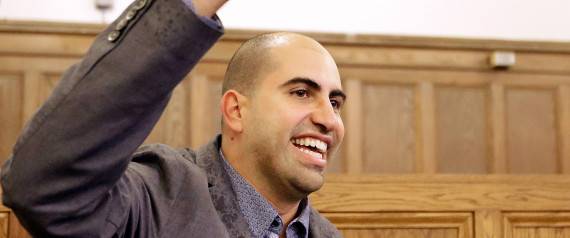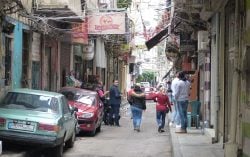How Free Is Free Speech? A One-on-one With Steven Salaita
Steven Salaita made headlines last year when he was denied employment at the University of Illinois at Urbana-Champaign after he criticized Israel on Twitter.

Initially, he had been offered a tenured position at the American-Indian studies program, but that changed shortly after his criticisms of Israel’s actions during the 2014 Gaza crisis.
If it’s “antisemitic” to deplore colonization, land theft, and child murder, then what choice does any person of conscience have? #Gaza
— Steven Salaita (@stevesalaita) July 20, 2014
Zionists: transforming “antisemitism” from something horrible into something honorable since 1948.
— Ste-ven Salaita (@stevesalaita) July 20, 2014
It’s no secret that criticism of Israel and the Israeli government are not taken lightly, and any remarks criticizing Israel are often conflated with anti-Jewish sentiment. Take, for example, Vanessa Redgrave’s Oscar speech in 1978 which caused many in the industry to condemn her remarks and stance on the issue. Also, Jon Stewart, has been called a “self-hating Jew” for calling to attention the deeply controversial nature of expressing a critical opinion of Israeli policies.
Salaita is currently suing the University that fired him for voicing an opinion, and although the uni-versity initially defended his right to free speech, it seems that pressure from students, alumni, and donors swayed their actions, and his employment was thus terminated. Still, a federal judge has not only allowed the lawsuit to go forward but maintains that free speech surrounding highly contentious issues or matters of public concern is especially vital to a free society.
I reached out to Salaita to ask a bit about the controversy, social media, and his future plans.
1) Were you surprised that your tweets were used to deny you employment?
Very surprised. I never imagined a university administration would so brazenly contravene the same principles of academic freedom it claimed to uphold. It was likewise surprising to learn how eager many academics and administrators are to conflate tweeting with teaching and scholarship. Many argued that my twitter style indicates that I’m incapable of good teaching. You’re comparing a classroom to Twitter? Twitter? Really?
2) What kind of reaction did your peers have? Your students? The virtual world?
There were various reactions, mostly outrage and shock. Folks in the Palestine solidarity move-ment organized immediately to have me reinstated. Pro-Israel groups organized immediately to defend the university. At first reaction [they] hewed pretty predictably to the political viewpoints of various constituencies. That’s changed, though. Only ardent ideological Zionists side with UIUC these days.
3) What do you say to academics/journalists/critics who say that your support of BDS, similar to the University of Illinois’ decision to link your tweets with your academic career, conflates the academic and the political?
Anybody who still believes that academe is somehow immune from the political is probably benefit-ing from the politics he pretends not to see. I would humbly suggest to people that investigating the tenets and actions of BDS quickly contravenes the various falsehoods around it.
4) Does this change how you approach social media now? Do you find yourself self-censoring? Or the opposite?
No, no self-censorship. I use social media less frequently, but I continue to condemn injustice. I’m not really the type to accept impositions on speech from centers of authority. Power relies heavily on self-censorship.
5) Do you feel that you will have more or less academic freedom in Lebanon?
I’ll find out soon enough! No place is exempt from pressure. Criticizing Israel may not be a big deal in Lebanon like it is in the US, so on that front I’m not especially concerned, but challenging power is a no-no anywhere in the world.
6) Do you think this will add fuel to the fire — that you are now living in a country that has been at war with Israel?
Not really. It just gives dimwitted Zionists something about which they can bloviate.
7) What do you plan on teaching at AUB?
I’ll be teaching an intro course in American Studies and then an upper-level section in Indigenous Theory.
8) Why did you decide to come to Lebanon? Have you always been interested for any particular reason?
I’m of Jordanian and Palestinian origin, so I’ve long had interest in the region. I’ve spent much time in Lebanon and love the country, both its people and geography. It’s an exciting place socially, in-tellectually, and politically. And AUB, of course, is a world-class university. I consider it a tremend-ous honor to work in Lebanon.
9) On a lighter note, have you heard about our recent garbage crisis? Are you excited to move from grassy Illinois to slightly garbage-y Lebanon?
I’m totally pumped about it. In the US we keep our garbage better hidden, but that doesn’t mean it smells any more pleasant. I’m pretty lazy, but not too lazy to walk around a few trash bags.





